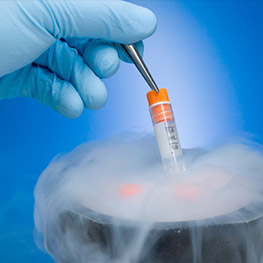FEMALE FERTILITY PRESERVATION
Women who are about to undergo cancer treatment have various options when it comes to fertility preservation. For example:
- Embryo cryopreservation. In this procedure, eggs are harvested from your ovaries, fertilized through in vitro fertilization (IVF), frozen and stored. Typically, at the beginning of your menstrual cycle you'll begin daily injections of synthetic hormones to stimulate your ovaries to increase the likelihood that multiple eggs can be collected during a cycle. Mature eggs are removed, combined with sperm - provided by a partner or sperm donor - and frozen. This method has the highest chance of success for women.
- Egg freezing (oocyte cryopreservation). Similar to embryo cryopreservation, you'll get injections of a medication to stimulate your ovaries and have your eggs harvested. Then your unfertilized eggs are frozen. This method requires the same amount of time as embryo cryopreservation.
- Ovarian transposition (oophoropexy). During this procedure - recommended if you're having radiation applied to your pelvis and no chemotherapy - your ovaries are surgically repositioned just before radiation therapy so they're as far away as possible from the planned radiation field. However, due to scatter radiation, the procedure doesn't always protect the ovaries. After treatment, you might need to have your ovaries repositioned again or use IVF to conceive.
Male Fertility Preservation
Sperm cryopreservation. Before cancer treatment begins, the patient has to provide semen samples through masturbation or another method, such as testicular sperm extraction via a needle. Samples are frozen and can be stored for years. Depending on the amount of sperm available, samples might be used with intrauterine insemination, where the sperm is thawed and placed in a woman's uterus, or with in vitro fertilization.
Service Brief
Cryo-preservation or Vitrification is a process where sperms , eggs or embryos are frozen at very low temperature without causing additional damage caused by the formation of ice crystals during freezing.
Embryos are frozen if a women is hyperstimulated, in case of poor endometrium and if couple wants to delay pregnancy. Extra embryos formed during IVF/ ICSI are sometimes frozen and saved for a future (much less expensive) pregnancy.
Service Information
Our very special Vitrification freezing technique essentially assures no damage to viable embryos. Therefore, the success rate for frozen embryo transfers in our program is just as high as for “fresh” IVF.
Our Cryopreservation Programme also offers the service of preserving fertility by egg and sperm freezing in a female and male, suffering from cancer, delaying pregnancy for career options, travelling overseas or social reasons.

